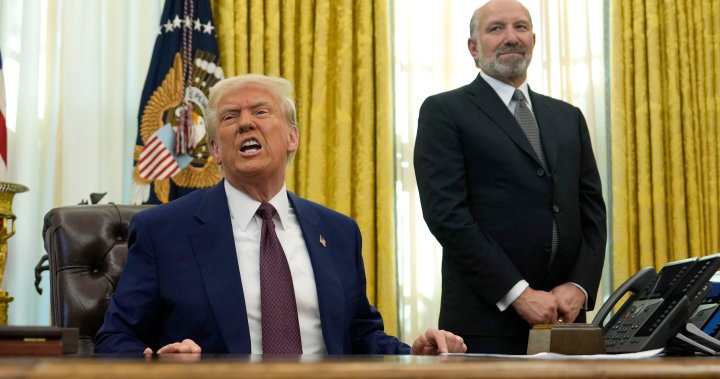Canada
What are ‘reciprocal tariffs’ and could they affect Canada?

1. Trump’s Announcement and the Risks of a Trade War
In a move that has sent ripples through the global economy, U.S. President Donald Trump announced the imposition of reciprocal tariffs on goods entering the country. This decision has sparked fears of an escalating trade war, with many experts and industry groups sounding the alarm. Trump’s strategy aims to match the tariffs other countries impose on U.S. goods, ensuring what he calls "fairness" in trade. However, this approach has raised concerns, particularly for countries like Canada, which could find itself caught in the crossfire. The tariffs are set to be implemented within weeks, following a review by Trump’s trade and economic team. This move marks a significant shift in U.S. trade policy, potentially disrupting long-standing international trade relations.
2. Understanding Reciprocal Tariffs and Their Implications
At the heart of Trump’s announcement is the concept of reciprocal tariffs, which involves matching the tariffs other countries impose on U.S. goods. This is distinct from retaliatory tariffs, which are imposed in direct response to new tariffs. For instance, Canada, which does not have across-the-board tariffs on U.S. goods, might face significant challenges if the U.S. proceeds with its threatened 25% tariffs. Experts like economist Moshe Lander emphasize that regardless of the terminology, the economic impact remains the same. The broader implications of this policy include extending beyond tariffs to taxes and non-tariff barriers, potentially affecting procurement policies that favor local businesses, such as those in Canada.
3. The Impact on Canada and Its Trade Relationships
Canada is particularly vulnerable to these changes, given its close trade ties with the U.S. Flavio Volpe, president of the Automotive Parts Manufacturers Association, warns that a global trade war could lead to inflationary pressures and hurt Canadian exports. The Canadian Chamber of Commerce has also expressed concerns, labeling Trump’s move as a step backward for the rules-based international trade order. President and CEO Candace Laing emphasizes that tariffs act as taxes, raising costs and threatening long-term economic decline. Canada has prepared retaliatory measures, but the uncertainty created by Trump’s rapid tariff announcements is already affecting businesses, which must stay vigilant to every presidential tweet.
4. Broader Economic Consequences and Reactions
The potential economic consequences of Trump’s tariffs extend beyond immediate trade disruptions. Experts caution that a trade war could lead to rising costs of goods, decreased consumer purchasing power, and job losses. The Canadian Federation of Independent Business notes that the uncertainty surrounding tariffs is already impacting businesses, making it difficult for them to plan for the future. These concerns are echoed by economists, who draw parallels to the protectionist policies of the past that exacerbated the Great Depression. The pursuit of such policies threatens to unwind decades of progress in global trade integration.
5. Targeted Countries and the Fairness Debate
While the U.S. aims to target countries with high tariffs, the approach appears indiscriminate, affecting both developed and developing nations. For instance, Brazil’s 18% tariff on U.S. ethanol could be matched, and the EU’s 10% tariff on vehicle imports is four times the U.S. rate. However, this strategy disregards the negotiated tariff rates that have historically considered the economic strengths of different countries. Critics argue that Trump’s approach undermines fair trade agreements and could harm both the U.S. and its trading partners. The move has been criticized as an attempt to revert to outdated trade models, which could have far-reaching consequences for global economic stability.
6. The Future of Global Trade and Historical Context
Perhaps the most concerning aspect of Trump’s tariffs is their potential to unravel the global trading order established since the end of World War II. Institutions like the GATT and the WTO have worked tirelessly to reduce trade barriers and promote fair trade practices. Trump’s policies jeopardize this progress, pushing the world toward a fragmented and protectionist trade environment reminiscent of the pre-World War II era. The Bank of Canada has highlighted the dangers of a global trade war, which could lead to prolonged economic downturns. As the world watches, the future of global trade hangs in the balance, with the U.S. at the helm of this potentially disastrous course.
Stay Informed
To stay up-to-date on the latest developments in this evolving trade landscape, consider subscribing to daily national news updates. These updates provide crucial insights into political, economic, and current affairs, helping you navigate the complexities of our interconnected world.











